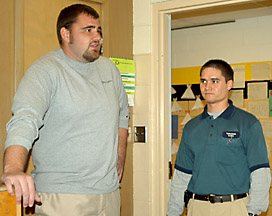
Children often outside of South Elementary School in Neosho, according to school officials, are being exposed to what they call "putrid" odors coming from MoArk, LLC.
NEOSHO - Democrat Jay Nixon, current attorney general of Missouri, has announced his bid for governor. Suddenly there's an interest shown by his office for what's happening in Southwest Missouri, and not just Springfield but the true southwest corner of the state.
Clint Barnett, an investigator for the attorney general's office came to town to find out just what has gotten people all riled up around here. He admitted that his office was surprised over the number of people [3600 and counting] who had signed the petition against the expansion of egg-producing CAFO, MoArk. LLC.
There was no coincidence that his announced visit by the press may have had something to do with his not being able to breathe the pervasive odors that often waft from the area around MoArk as he was chauffeured around town by Rick Bussey and accompanied by Mark Adams, two opponents of the proposed MoArk expansion.
Rick Bussey's running commentary, however, as he drove past various locations filled in the gaps. He pointed to the Lazy Boy plant with its 1,010 employees and informed his guest that the smell has gotten so bad that employees were sent home, that people leaving the YMCA on the edge of Crowder College have left the building and said the smell has taken their breath away, and that, of course, the college campus within two miles of MoArk was particularly privy to the odors.
Barnett was shown the sign informing motorists to report offensive odors to the DNR followed by the newer MoArk facility where a semi had blocked the view of the chicken removal operations after Rick Bussey's video of MoArk dumping live chickens into a dumpster got them a citation for animal cruelty; the manure control building that MoArk officials had said they would tear down but that still is operating, a building put up without construction or operating permits; and the two lagoons on public land that the DNR never ordered to be drained due to the high cost to the company.
Calling attention to the trees MoArk recently planted that were supposed to have been part of an odor control plan mandated years ago, Rick Bussey asked, "Do they look like a shelter belt you can kick a pheasant out of?" Adams suggested that MoArk officials do what they want to do without DNR intervention. Nothing is spelled out clearly, he added. And while Rick Bussey could point to an area where MoArk's dumping of manure had broken a dam on private property, he admitted to Barnett that "we don't know what they're doing now. We have no access to the property."
A mile or so further down the road Rick Bussey pointed to the dry creek beds and the requirement by MoArk, as he put it, to suck out billions of gallons of water while his wife shuts off the water immediately after use.
"The wells need to be spaced. Mo-Ark's wells are overlapping," Rick Bussey said. Adams interjected how requirements for drilling wells have gone from 200 feet to 600 feet with the water table constantly continuing to fall.
A visit to Ervin Bussey's home
 Gathered around a table at the home of Ervin Bussey at left are investigator Barnett from the attorney general's office; Mark Adams, SWMCALME organizer; and Ervin's son Rick.
Gathered around a table at the home of Ervin Bussey at left are investigator Barnett from the attorney general's office; Mark Adams, SWMCALME organizer; and Ervin's son Rick.
Rick Bussey's Dad Ervin lives in a country home in a once pristine valley near Bullskin Creek. Rick's Dad needed convincing to talk to the AG's rep. He absolutely was not convinced that the effort would be worth his while, but he acquiesced. He had made notations on the odor control plan that was supposed to be implemented by MoArk in 2002. He gave them to his Jeff City visitor.
"If the DNR continues to give MoArk extensions every time something goes wrong, we are not going to get anywhere," Ervin Bussey told Barnett. "Regarding the odor control plan, planting 17 trees for a 300 foot building is like a slap in the face."
Barnett had to agree that MoArk's effort of planting was "not going to work."
In addition to odor issues that prohibit the enjoyment of his land, Ervin Bussey wanted to know what could be done about the flies that covered his white house until it was black. Rick Bussey made it clear that flies were of a particular species associated with chickens rather than cattle.
Although Barnett's response was, "I don't know." He promised to get with his boss, Assistant Attorney General Bill Bryan.
"Your complaints are not falling on deaf ears," Barnett told Ervin Bussey. "I'm the delivery guy, the only one to collect information." He assured his host that the impact of the information would be discussed and that "we will see where we go from there."
Calling attention to the odor issue in Carthage with the operation of RES and the intervention on behalf of the people by the mayor and other officials, Ervin Bussey acknowledged the need for government support. "We don't have that privilege around here," he said. "You're the only one [he meant of significance, not counting the DNR's politically-hired ombudsmen] who's ever made an effort to come down to talk to us. What can you do?"
Barnett did admit that he found amazing the number of areas in which the DNR was not regulated by law. "Without the law, our hands are tied," he said.
In answer to why nobody openly complained before, Rick Bussey explained how nobody thought of involving government but that they tried to take care of problems themselves. He remembered a conversation they had with MoArk founder Hollis Osborne in which he assured them that the offending operation would be moved to Colorado. Hold off a while, Osborne reportedly said. They did until they were told that MoArk was going to build new facilities on their existing property.
"We went by an honor system. I guess we're a lost breed," Ervin Bussey concluded.
School's in session
 Ben Jones and Jason Welch, teachers at South Elementary School in Neosho confirm the problem with odor found outside the school.
Ben Jones and Jason Welch, teachers at South Elementary School in Neosho confirm the problem with odor found outside the school.
High on a hill overlooking Route 60 sits South Elementary School. When Rick Bussey's pick-up reached the school drive, its occupants could see children playing outdoors. The principal Sandy Davidson had arranged a meeting between Barnett and several teachers who wanted to voice their opinions regarding the odors around the school grounds. Most of them described the air on certain days as being "just putrid."
Sheila Freund, in her 26th year of teaching, has heard children ask, "What's that smell?"
Barnett especially seemed to be interested in the observation of the children. Ben Jones, a gym teacher confirmed that on many occasions the odor is so bad that kids want to go inside but, he added, "a lot of days we just put up with it. He said it made his eyes water being out there.
Shannon Lupini, who has taught art for 8 years, was concerned about how MoArk's expansion would increase the odor. "It would be really unbearable" was her opinion as she described the architecture of the school as demanding the need to go outside to pass from one area to another.
Cramming into the office of the health department
 Investigator Clint Barnett looks over a chart showing the high concentration of CAFOs in Newton County. In the background are, L-R, Rick Bussey, Dale Jobe and Bob Culp.
Investigator Clint Barnett looks over a chart showing the high concentration of CAFOs in Newton County. In the background are, L-R, Rick Bussey, Dale Jobe and Bob Culp.
Barnett, Adams and Rick Bussey were met by board member Dale Jobe, director Bob Culp and clean water advocate Bill Miller. Reporter Wes Franklin who had crossed the parking lot from the office of the Neosho Daily also was present. The gist of the conversation centered around the draft health ordinance being perfected by these Newton County health department officials.
While Jobe described their efforts as being in the listening/learning mode, Culp admitted the urgency in getting an ordinance in place before any state legislation might prevent them as county officials from protecting the environment and the health of their residents. And both wanted to make it perfectly clear that they weren't against anybody, that they were dealing strictly with health issues.
"If we had enacted a health ordinance 25 years ago, we would have caught the drop in the water table," Jobe commented, adding that they were going to be concerned with "prevention." He also said he was not aware of the number of CAFO units in the county and called attention to the 100-150 Class II CAFOs not permitted by the DNR and consequently not inspected.
"There's an urgency to do something now to get all of them under the damn umbrella," Culp retorted, but still he was concerned over how enforcement would be met. A 5-cent per mil tax brings in $300,000 towards their $830,000 operating budget. Federal pass-through money and fees help make up the difference. Culp expressed concern over taxpayers not approving an increase that would support the hiring of the additional personnel needed to run the program.
Reiterating that they were dealing with a health issue and had no intention of hurting economic growth or the small farmer, Culp said that the toughest issue that they must deal with pertains to assessing odor and litter control. Adams questioned the ratio used to determine odor. Rick Bussey gave anecdotal evidence when he described the one odor tester whom he said "puked taking a sample...and that it stunk so bad he had to change his clothes." However when the sample was tested in the Minnesota lab used for that purpose, it was half of what was considered a violation range.
While Culp seemed satisfied that the litter haulers from Northwest Arkansas spreading in Wentworth were doing a decent job, he was concerned over how many others weren't. He mentioned the ads he had seen in the Big Nickel placed by haulers who so far have not been regulated by the county.
Jobe saw problems with oversight on the state level in commenting, "Our wells are not drinkable...nobody at the DNR is looking at day to day issues." However, he admitted that on certain levels the DNR's hands were tied because of the way the state legislature has set up laws.
Culp especially was critical of the state's guidelines for stream protection. "The DNR doesn't understand the concepts of microbiology," Culp said. "From a public health standpoint all public streams and creeks should be disinfected." His concerns were not just with full body contact but with indirect exposure where, as an example, a pet exposed to pathogens in a small creek might pass them along to kids.
Rick Bussey seemed to think that DNR Director Doyle Childer's denial of science had a lot to do with fostering a political agenda. After all, pulling the wool over people's eyes worked once, he mused.
Last stop Marco Group, Inc.
Richard Davidson, president of Marco Group, Inc., 5400 Doniphan Drive (corner of D Highway), said he was not willing to give up his Egg McMuffin in the morning. He accepts the need for eggs and realizes that litter stinks, but he said, "shame on them [MoArk] for letting the odor problem get out of control." He said he "can't imagine that the biodiesel plant can be any worse" referring to the odor issue with RES that has caused Gov. Matt Blunt to intervene to close down the plant.
One of the company's 25 employees agreed that the stench could be overwhelming depending upon the direction of the wind.
The conclusion reached by Barnett was that odor "obviously was a community-wide issue affecting the quality of life." He understood how people had put up with it but now that MoArk was expanding that they have to do something about it. However, just what assistance will come from the office of the attorney general remains to be seen.






Comments